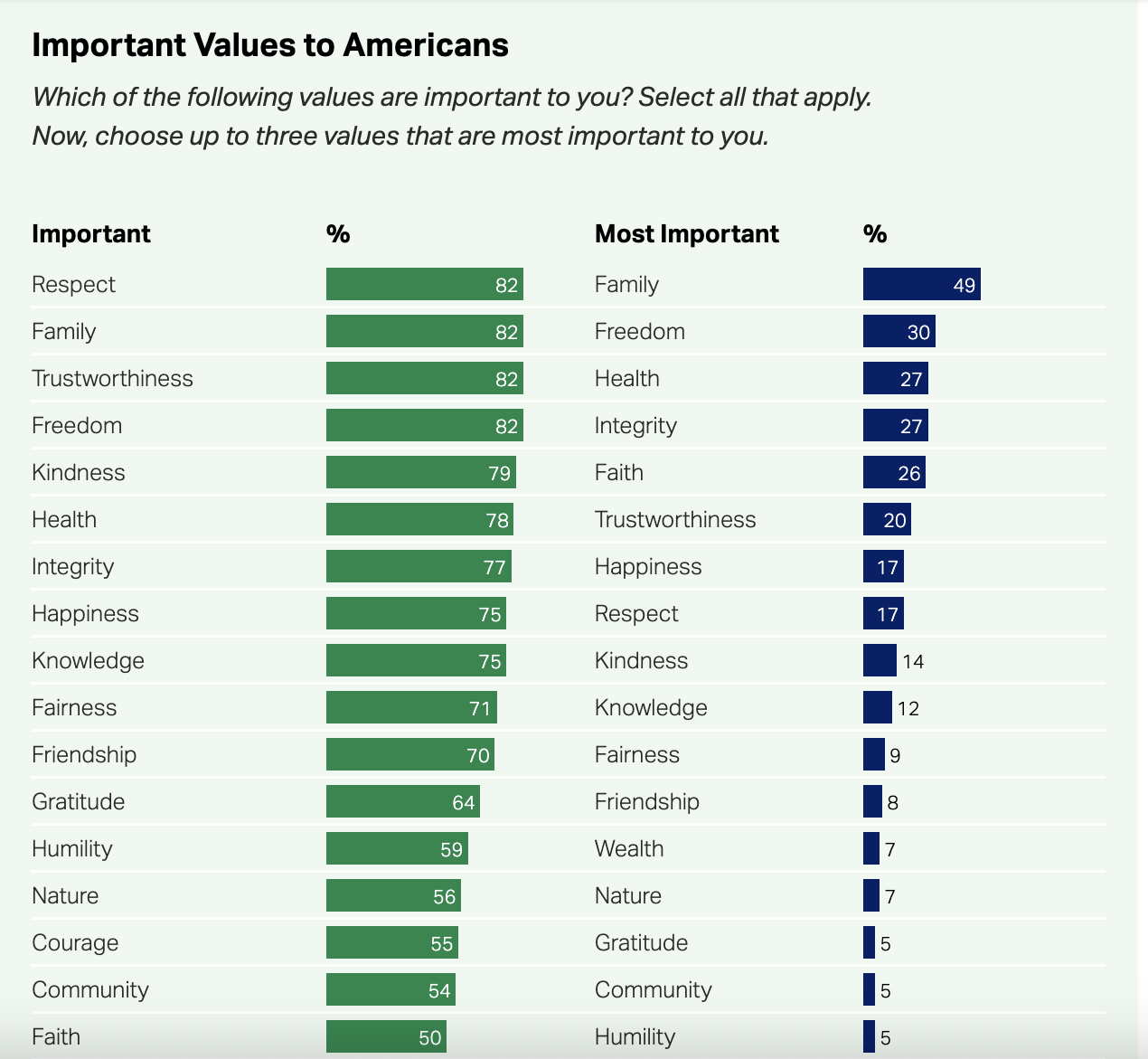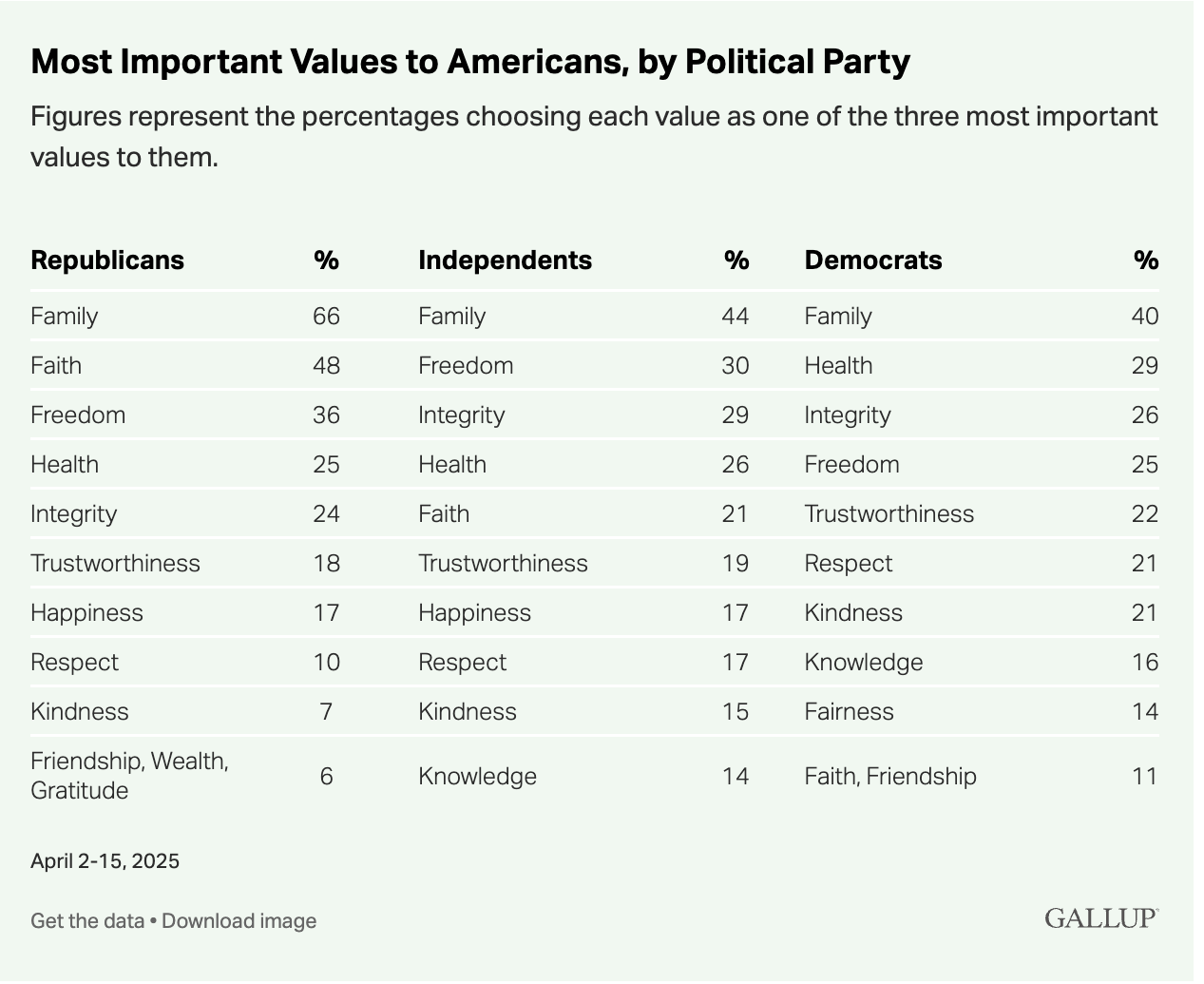Family, Faith And Freedom: What Do Americans Value Most?
NEW YORK — While Americans widely believe in values such as respect, trustworthiness and kindness, it’s family, freedom and faith that are considered “most important” and hold the most sacred space in the national conscience, a new study reveals.
Nearly half of U.S. adults (49%) say family is one of their top three personal values —far more than any other value – according to a new Gallup-Aspen Ideas survey.
Read: Is Your July 4th Hot Dog Tradition Kosher?
Freedom, health, integrity, and faith trail behind but still hold substantial ground, each named by roughly a quarter to a third of respondents. On the other end of the spectrum, ideals such as beauty, wealth, adventure, achievement and innovation find little traction. While 28% say wealth is important, just 7% consider it among their top priorities.
The findings come from a nationally representative web-based survey of some 2,000 adults, conducted this past April. Participants were presented with 23 values and asked to first select those they find “important,” then to narrow those down to the three they consider “most important.”
Although broad agreement exists around certain shared values — over 80% say respect, family, freedom and trustworthiness matter — Americans diverge sharply when pressed to rank what matters most.
Among Americans who attend religious services weekly, faith eclipses even family. For this group, 76% name faith as a top-three value, compared to 65% who say the same for family. This pattern flips among the general public, for whom faith ranks below family, freedom and health.
Faith presents a striking case: Though only half of Americans say it's important, more than half of that group go on to identify it as one of their top three values. That propelled faith into the top tier of “most important” values, despite its lower ranking in overall importance.
The country’s political divide can also be seen in this survey. Nearly half of Republicans (48%) said faith was among their top values, while only 21% of independents and 11% of Democrats agreed. Republicans also lean more heavily toward freedom, while Democrats and independents are more likely to prize respect and kindness.
According to a recent Pew Research Center study, Donald Trump won the White House last year by sweeping evangelical Protestants with 81%. More intriguing are Trump’s significant 2024 gains with other groups, compared with 2020. Support of white Catholics increased from 57% to 62%, Hispanic Catholics from 31% to 41%, Black Protestants from 9% to 15% and Protestants of other races, including Asians, from 55% to a notable 70%.
Educational background also shapes how values are prioritized. Among Americans with a post-graduate degree, integrity (39%) essentially ties with family (37%) as a leading value. For those with a high school education or less, family is more dominant.
Older Americans are more likely to value both freedom and faith. Four in 10 adults 65 and older say freedom is one of their most important values, compared to just 20% of adults under 30. Similarly, health and faith matter more to adults 50 and up than to younger generations.
Women, married people and Republicans are all more likely to place family at the center of their value system, while younger, more educated and politically progressive Americans give greater weight to values like kindness, knowledge, and respect.
While Americans may agree broadly on what values are important, the survey reveals notable splits in what people ultimately prioritize. Respect and kindness, for example, are listed by the vast majority as important — but fall out of the top five when respondents must choose what they value most.
Finding value and importance in freedom, especially after the pandemic, doesn’t mean Americans love America.
In another Gallup study released this past Monday, a record-low 58% of U.S. adults said they are “extremely” (41%) or “very” (17%) proud to be an American. That’s down nine percentage points from last year and five points below the prior low dating back to 2020.
The survey was conducted from a June 2-19, before the June 21 U.S. military bombing of Iran.
Clemente Lisi is the executive editor of Religion Unplugged.


